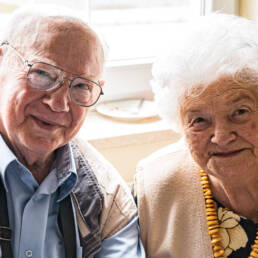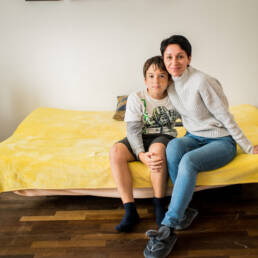Author
Cindy Franssen
Member of the European Parliament
EPP Group
I would like to congratulate Caritas Europa for its excellent report Caritas CARES!. The report gives important data regarding access to affordable health care, housing, childcare, education, home care, services for older persons and persons with disabilities, in different countries, and identifies the difficulties and challenges for the coming years.
Access to these services can make a world of difference for people living in poverty or at risk of poverty or social exclusion.
Today, still 113 million Europeans – 1 in 5 – remain at risk of poverty. This is unacceptable. With the Europe 2020 strategy for smart, sustainable and inclusive growth, the aim was to bring at least 20 million people out of poverty and social exclusion by 2020. Europe managed to reduce the number of people living in poverty by 6 million people over the past 10 years, but unfortunately, this is not enough. We need to be more ambitious!
The EU therefore urgently needs a new, concrete, ambitious and comprehensive action plan to fight poverty, with concrete legislation and measures that can help people to break the cycle of poverty.
That is step 1 of the Action Plan for the Social Pillar to me. That is where is starts. We have to move forward step by step to make the rights and principles of the European Pillar of Social Rights effective and relevant for people. For me, these are the 5 priorities in the fight against poverty:
First and foremost, the effective access to rights, the take-up of rights, minimum income, the fight against in-work poverty, against child poverty, access to affordable housing and the fight against homelessness have to be an integral part of a new anti-poverty strategy.
Second, in the fight against poverty we will also need sufficient EU funding. The Parliament has clearly indicated it wants to increase the budget for European Social Fund Plus (ESF+) (120,5 billion EUR) in the next Multiannual Financial Framework, and we will insist on this. We will not allow that the Just Transition Fund (7,5 billion EUR) is financed de facto through cuts in ESF+. The Green Deal, the transition into a green economy, has to be a socially fair transition.
Third, the only way to show people, living in poverty, that we care about them and that we take their problems seriously is to make sure that the budget for social inclusion, Food Aid to the Most Deprived and programmes to guide people to the labour market is high enough to make a real difference.
Fourth, the European Child Guarantee will be a crucial instrument. Every child in Europe at risk of poverty or social exclusion needs to have access to health care, education, housing and food. Both Commission President Ursula von der Leyen and Commissioner Schmit have shown their commitment in this respect.
Fifth, we should also support the families in which children grow up, by guaranteeing families’ social fundamental rights: a decent home, access to health care, and we need to make it possible for parents to better balance their work and family lives.
As a member of the European Parliament, I want to continue the fight against poverty, and continue the work I have previously done as a Member of the Flemish Parliament, the Belgian Senate and Member of the Parliamentary Assembly of the Council of Europe.
As the co-Chair of the European Parliament’s Intergroup Fighting against poverty and as a member of the parliamentary committee on Employment and Social Affairs, I will make sure that the fight against poverty will stay high on the political agenda.
The 12 recommendations in the Caritas report (a.o. invest in people and help them to find qualitative jobs, safeguard access to social rights, non-discrimination, implementing the European Pillar for Social Rights, guaranteeing the future ESF+, participation of people with direct experience of poverty or social exclusion) will help and inspire me to take further steps in the fight against poverty.
I will do my utmost to help to realise an ambitious anti-poverty strategy that prioritises the eradication of poverty and supports the implementation of the European Pillar of Social Rights and the Sustainable Development Goals. I will do this together with my colleagues in the Parliament, with the European Commission, and most important, in dialogue with organisations and people living in poverty or social exclusion. The fight against poverty is a fight we can only win together.
About the author:
After obtaining a Master’s Degree in Political Science at the University of Ghent in 1998, Cindy Franssen started her political career (CD&V) as a provincial councillor in East-Flanders. From 2007 onwards, she was a Member of the Flemish Parliament and, from 2009 onwards, also a Member of the Belgian Senate. From 2010 to 2017, she was a Member of the Parliamentary Assembly of the Council of Europe. She was Alderman for Social Affairs in Oudenaarde between January 2019 and June 2019 and is currently member of the local Council of Oudenaarde.
Since 2011, she is Vice-President of her Political Party CD&V.
In May 2019, she was elected as a Member of the European Parliament (EPP Group).
Cindy Franssen is a full member of the Committee on Employment & Social Affairs and the Committee on Women’s Rights & Gender Equality, and a substitute member of the Committee on the Environment, Public Health and Food Safety. Moreover, she is Vice-Chair of the European Parliament’s Delegation for relations with India.












